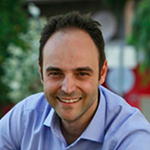

 Dr. Naris Steryios
Dr. Naris Steryios Steryios Naris is a researcher at the Department of Mechanical Engineering of the University of Thessaly. He held visiting positions at the Technological Educational Institute of Larisa and at the Department of Mechanical Engineering of the University of Thessaly for more than 12 years. He is also collaborating with the Hellenic Institute for Occupational Health & Safety. He has a degree in mechanical engineering from the Aristotle University Thessaloniki (1998) and M.Sc. (2003) and Ph.D. in microfluidics (2005) from the University of Thessaly. His Ph.D. thesis received the 1st Award from the Hellenic Association of Computational Mechanics in 2005. His work is focused on the numerical simulation of nonequilibrium flows with applications in micro- and nano-flows and vacuum systems including single gas and mixture flows. He is author or co-author of 20 refereed scientific publications in journals and more than 50 articles in international conference proceedings.
Vacuum pumping systems are critical parts of the design of fusion reactors such as ITER and DEMO. They are incorporated in different subsystems including the torus evacuation circuit and the neutral beam injector (NBI). In both cases, the requirements, including the operational parameter values and other technical issues, does not allow the usage of typical commercial systems. More specifically, systems have to be compatible with tritium, be able to handle high pumping speeds and in the DEMO case, separate hydrogen isotopes.
The design of ITER vacuum system employs six cryopumps, all based on cryopanels, cooled with supercritical helium and coated with activated charcoal as sorbent material. For DEMO, scaling up the ITER system is not an option, since issues such as system complexity and high cost will arise, while there is a risk of not fulfilling all operational requirements. In addition, DEMO has to recycle with the highest possible efficiency tritium and thus separation of exhaust gases is a pre-request.
In this work, recent developments in the framework of the EUROfusion DEMO Programme and its work package Tritium-Matter Injection-Vacuum (TFV) are presented. Details on the new design for the pumping system which is developed and tested are provided, including vapor diffusion pumps for high throughputs and pressures, liquid ring pump and metal foil pump which can be used for separation of hydrogen from other species. Furthermore, issues concerning the development of a multstage cryopump, which allows separation of exhaust gas species and is also explored to be used as a fallback solution, are given. Finally, some indicative numerical and experimental results are presented.